Basil (Ocimum basilicum) is a fragrant culinary herb from the mint family (Lamiaceae), widely used in Mediterranean and Asian cuisines. Beyond its aroma and flavor, basil is valued for its impressive nutritional profile and natural plant compounds that may support health in multiple ways.
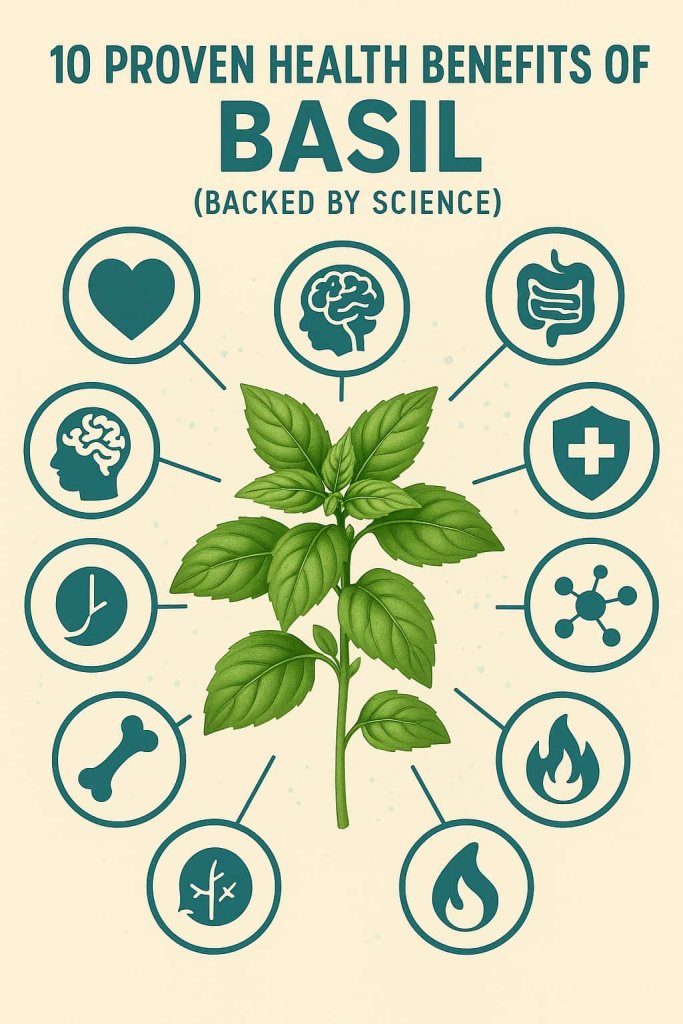
Fresh basil contains essential oils, antioxidants, and phytonutrients that contribute to its potential wellness benefits. Several species exist—such as sweet basil, Thai basil, and holy basil (Ocimum tenuiflorum or tulsi*)—each offering unique bioactive compounds like eugenol, linalool, and rosmarinic acid.
What Is Basil? (Overview and Nutrition Profile)
Basil (Ocimum basilicum) is an aromatic herb belonging to the mint family, Lamiaceae, and is widely used in Mediterranean, Asian, and Ayurvedic traditions for its culinary and aromatic qualities. Known for its sweet, peppery fragrance and vibrant green leaves, basil adds both flavor and nutrition to a variety of dishes—from pasta sauces and salads to teas and herbal infusions.
There are several varieties of basil, each with distinct taste and phytochemical profiles:
- Sweet basil (Ocimum basilicum) – the most common type used in Western cooking.
- Thai basil (Ocimum basilicum var. thyrsiflora) – has a stronger, licorice-like flavor and higher concentration of essential oils.
- Holy basil (Tulsi) (Ocimum tenuiflorum) – valued in Ayurvedic practice for its adaptogenic and antioxidant properties.
Basil’s characteristic aroma comes from essential oils such as eugenol, linalool, and methyl chavicol, compounds that contribute to its flavor as well as its potential health-supportive properties.
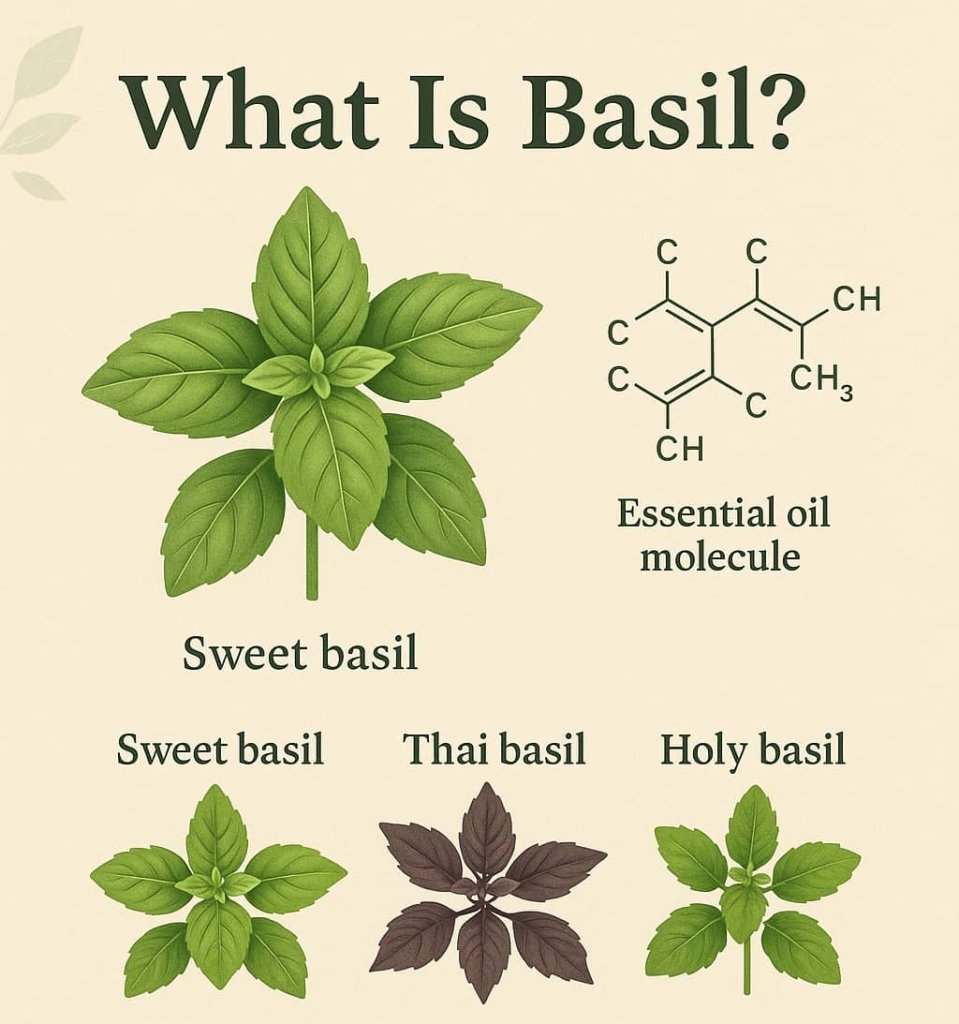
Nutritional Profile (Per 2 Tablespoons / 5 g of Fresh Basil)
| Nutrient | Amount | % Daily Value* |
|---|---|---|
| Calories | 1 | — |
| Vitamin K | 29 µg | 24% |
| Vitamin A | 277 IU | 6% |
| Vitamin C | 1.3 mg | 2% |
| Manganese | 0.1 mg | 3% |
| Magnesium | 4 mg | 1% |
| Calcium | 9 mg | 1% |
| Iron | 0.2 mg | 1% |
*Percent Daily Values are based on a 2,000-calorie diet.
Source: U.S. Department of Agriculture (USDA) FoodData Central.
Basil is rich in vitamin K, an essential nutrient that supports bone and blood health, and provides small but valuable amounts of vitamin A, vitamin C, manganese, and magnesium—all of which contribute to immune function, antioxidant protection, and cellular metabolism. Its combination of micronutrients and plant-based phytonutrients makes basil a simple but powerful addition to a balanced diet.
10 Proven Health Benefits of Basil (Backed by Science)
Modern research continues to uncover how basil’s natural compounds may support wellness in measurable ways. Below are ten science-backed benefits that highlight this herb’s nutritional and functional value when included in a balanced diet.
1. Rich in Antioxidant Compounds

Basil is naturally rich in plant-based antioxidants such as flavonoids, phenolic acids, and rosmarinic acid, which may help protect cells from oxidative damage. According to the U.S. Department of Agriculture (USDA) FoodData Central, basil provides small but meaningful amounts of vitamins A and C—both recognized antioxidants that contribute to immune defense and skin health.
Research published in the Journal of Agricultural and Food Chemistry notes that basil’s orientin and vicenin compounds may support protection against oxidative stress, a factor linked to aging and cellular inflammation.
2. Supports Immune Function
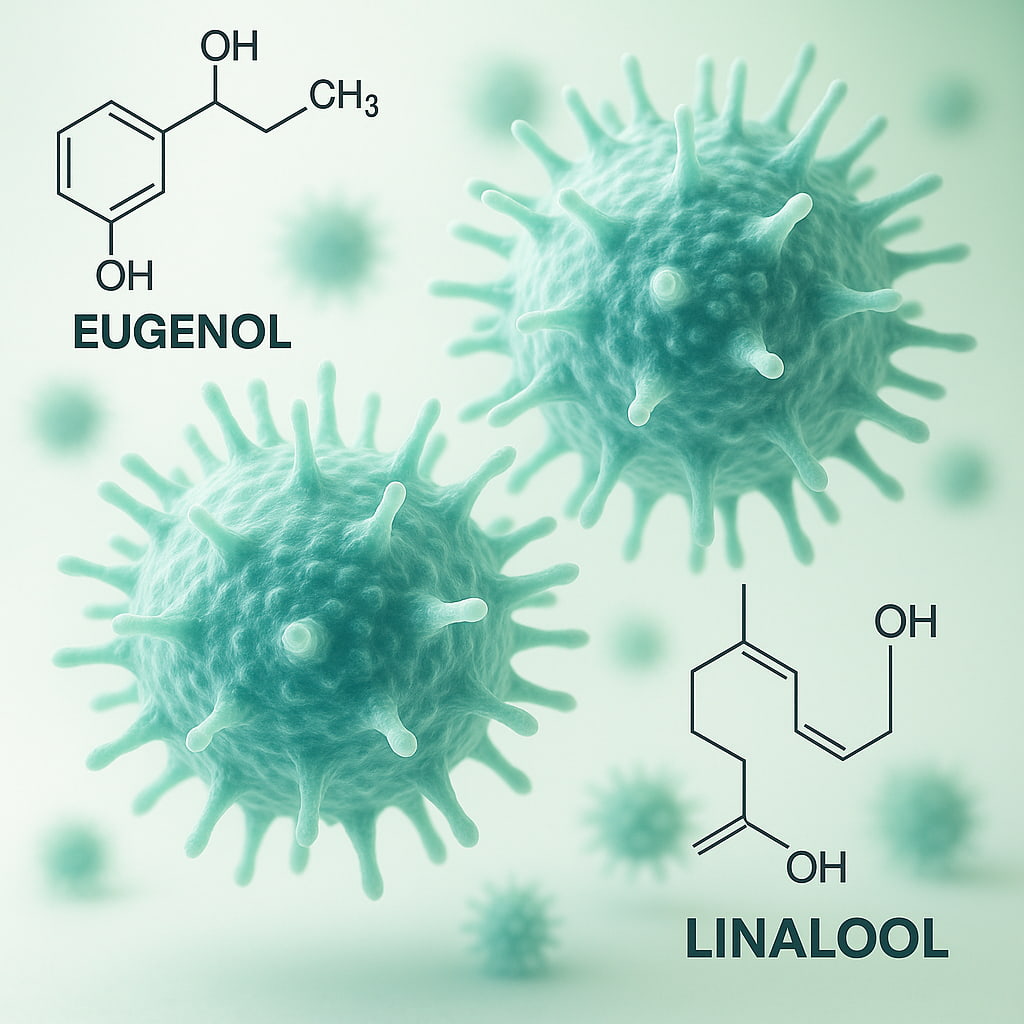
Basil’s essential oils—particularly eugenol, linalool, and citronellol—demonstrate immune-supportive and anti-inflammatory actions in laboratory studies. The National Institutes of Health (NIH) highlights that plant polyphenols like these can help regulate immune signaling pathways and protect cells from environmental stressors.
Including basil as part of a nutrient-dense diet rich in fresh herbs and vegetables may help support the body’s natural defense mechanisms against daily stress.
3. May Promote Heart Health
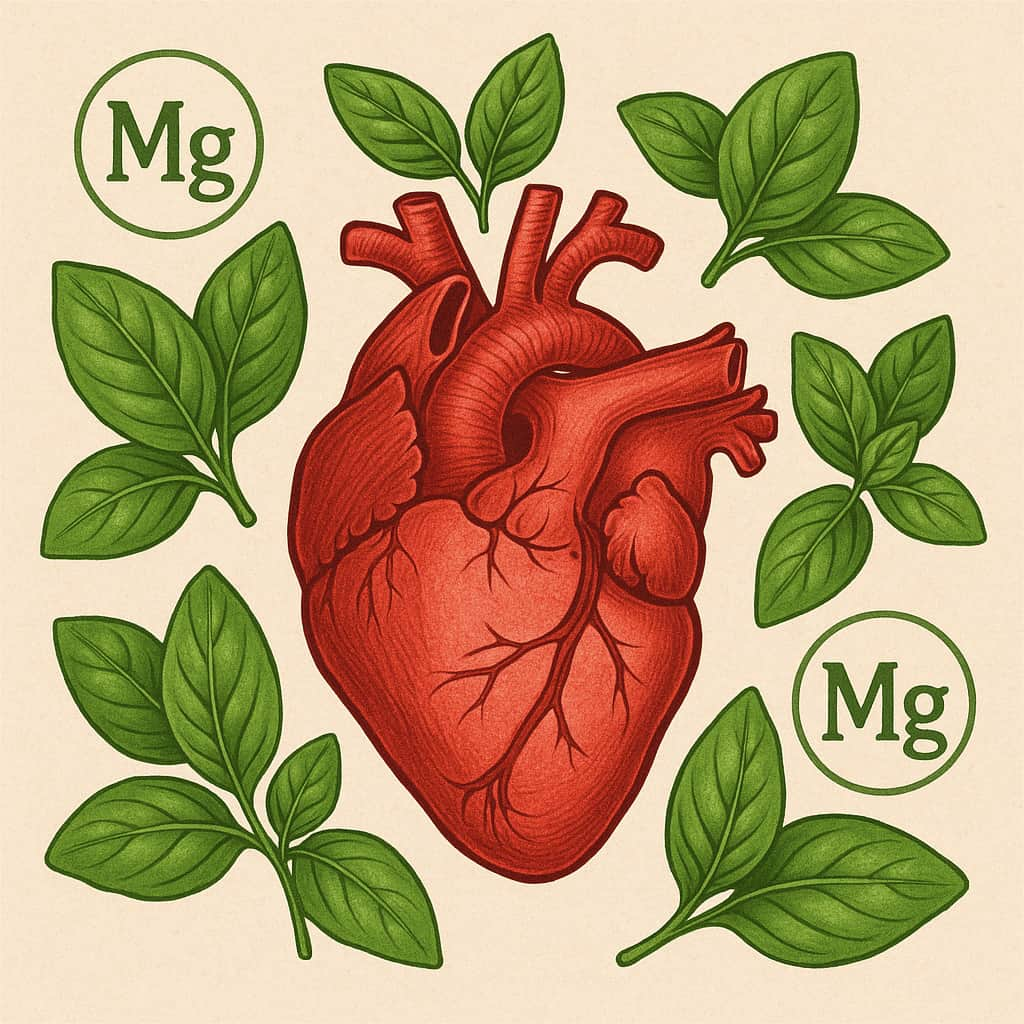
The magnesium and eugenol in basil may support blood vessel relaxation and promote balanced circulation. According to the Harvard T.H. Chan School of Public Health, magnesium plays a vital role in maintaining a steady heartbeat and healthy blood pressure.
Additionally, research suggests that diets abundant in antioxidant-rich herbs like basil may support overall cardiovascular wellness by reducing oxidative stress that affects arterial health.
4. Supports Gut Health and Digestion
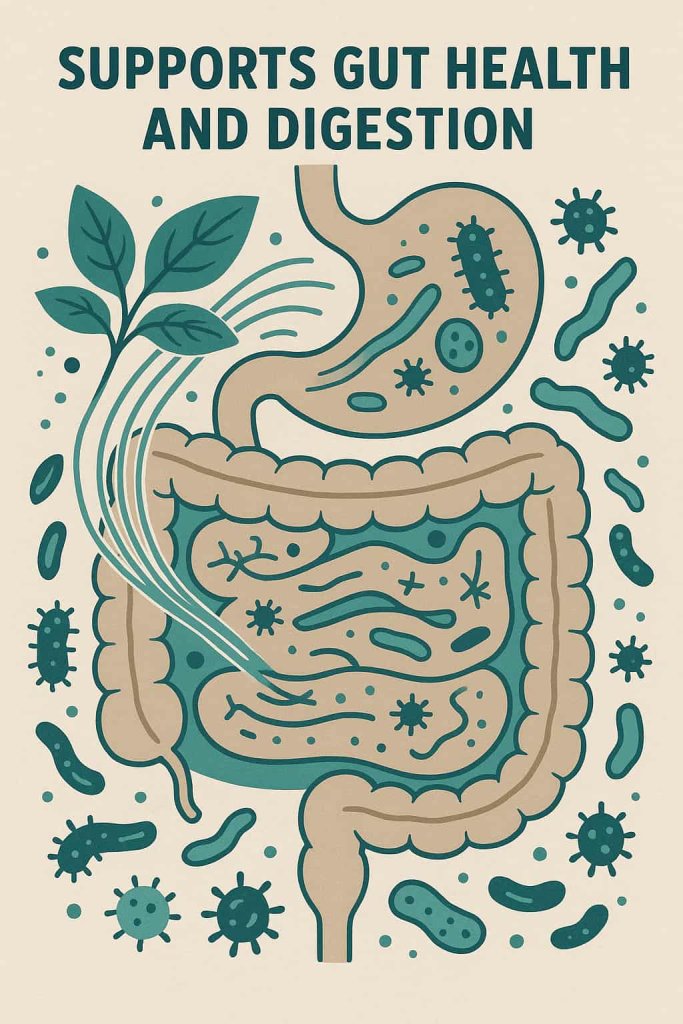
For centuries, basil has been valued in traditional medicine systems for its digestive benefits. Modern studies now suggest that basil’s essential oils may support gut motility and microbial balance. According to the Cleveland Clinic, herbs containing natural plant oils can support digestive comfort and may help maintain a balanced gut microbiome when used in moderation.
Adding fresh basil to meals—especially fiber-rich dishes—may gently aid digestion while enhancing flavor and aroma.
5. May Help Manage Stress and Mood
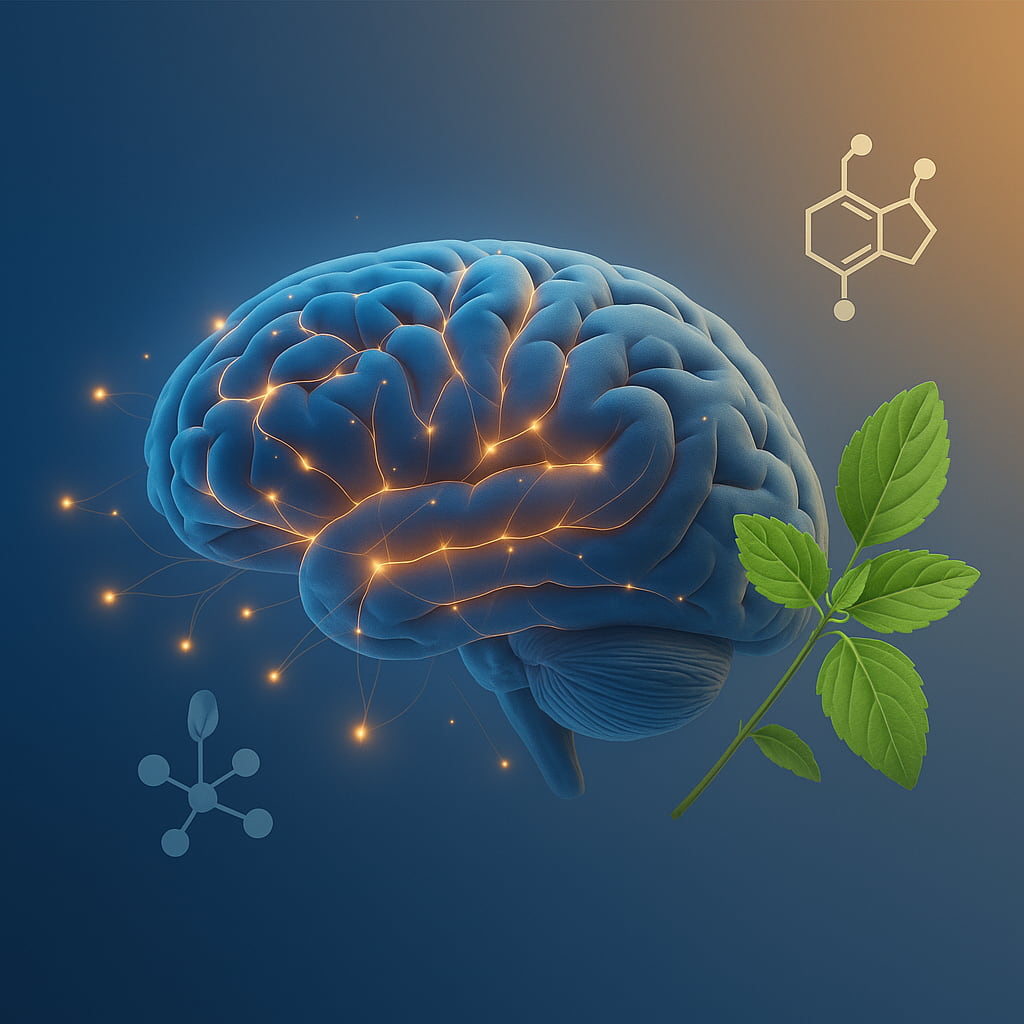
Holy basil (Ocimum tenuiflorum, also called tulsi) has been studied for its adaptogenic properties—compounds that may help the body adapt to stress and maintain balance. Reviews from the National Center for Complementary and Integrative Health (NCCIH) indicate that tulsi contains ocimumosides and ursolic acid, which may influence mood, focus, and energy levels.
Incorporating basil tea or tulsi infusions into a calming evening routine can be part of a broader wellness approach that supports mental clarity and emotional resilience.
6. Supports Metabolic Health
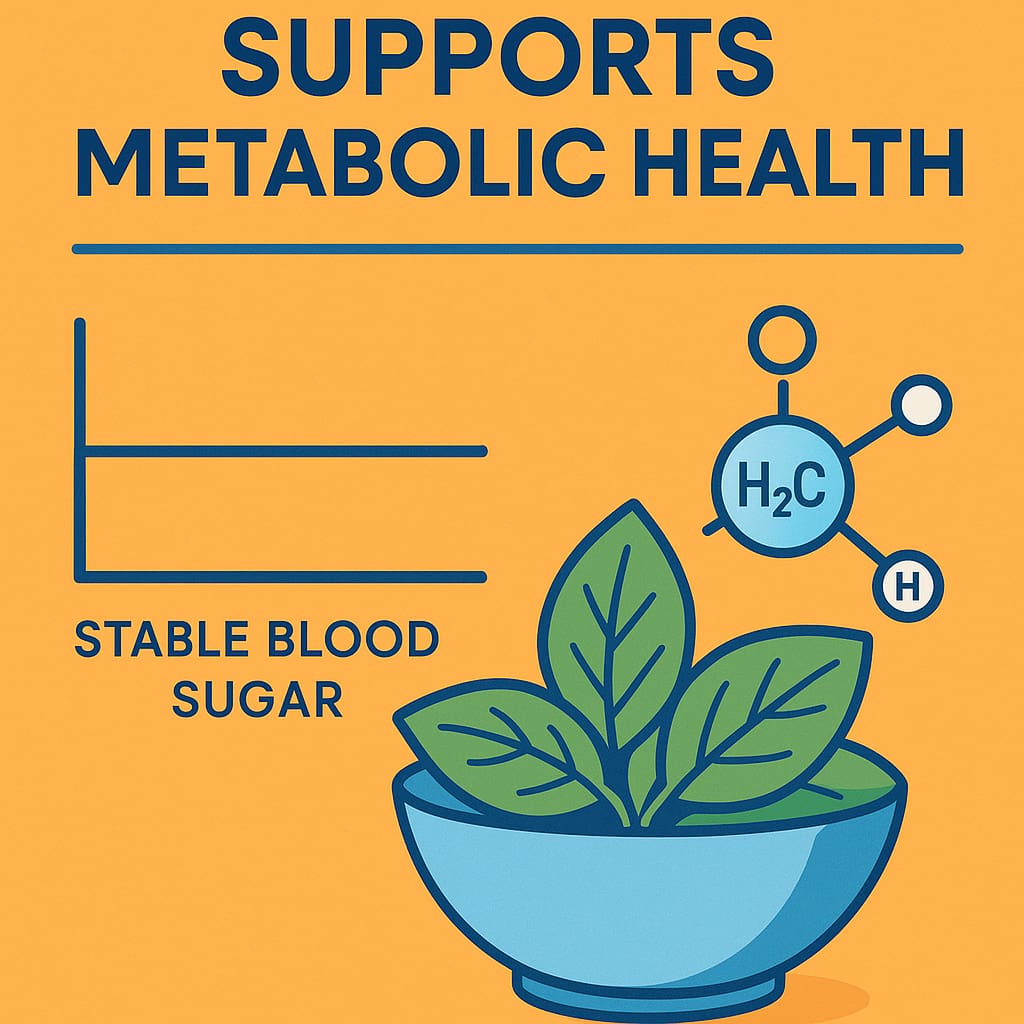
Emerging research suggests that basil extract may help support healthy blood sugar regulation when paired with a balanced diet and regular physical activity. A study summarized by the National Library of Medicine notes that basil’s bioactive compounds could influence carbohydrate metabolism and oxidative stress markers.
While more human studies are needed, consuming basil regularly as part of a nutrient-rich diet may complement broader metabolic wellness efforts.
7. May Support Liver and Detoxification Processes
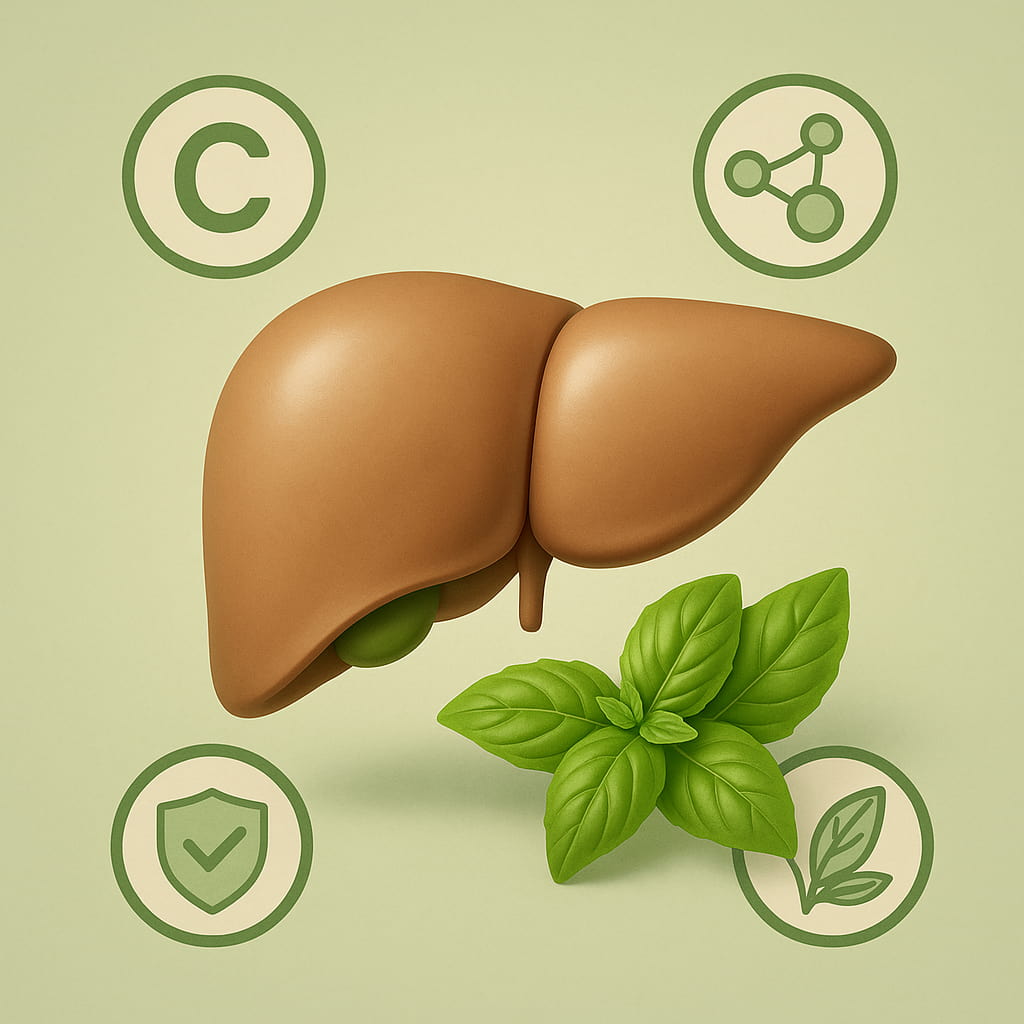
Animal research indicates that basil’s antioxidants and essential oils may support liver enzyme activity and natural detoxification pathways. The NIH Office of Dietary Supplements notes that plant antioxidants help maintain the body’s balance of reactive oxygen species—supporting the liver’s normal cleansing functions.
Although basil alone cannot “detox” the body, it may contribute to overall liver wellness when combined with a diet rich in fruits, vegetables, and hydration.
8. Promotes Skin Health
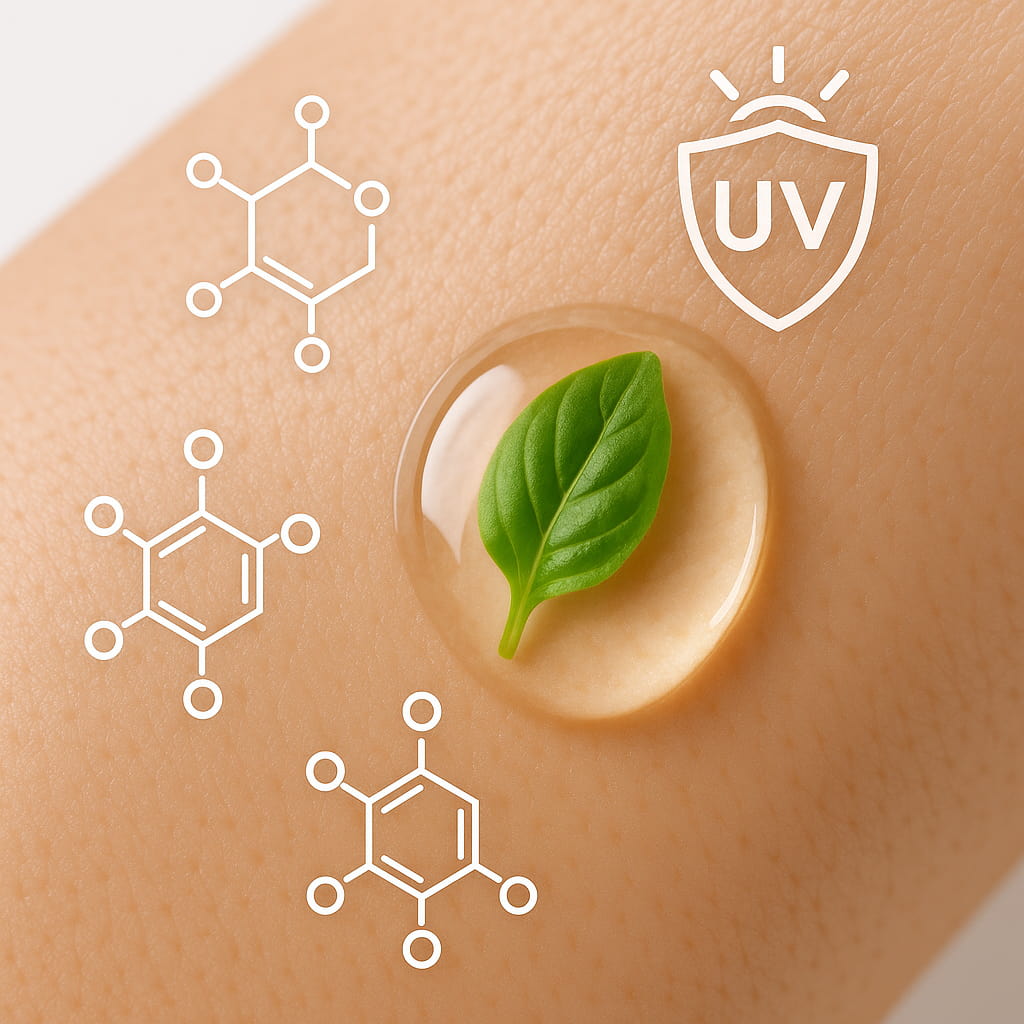
Basil’s essential oils—especially eugenol—possess antimicrobial and antioxidant properties that may help support the skin’s natural defense barrier. According to the American Academy of Dermatology Association (AAD), diets high in antioxidants can help maintain skin appearance and resilience by reducing oxidative stress.
Consuming basil in meals or herbal teas may therefore support skin wellness indirectly, though it should not replace established skincare or sun-protection practices.
9. Supports Bone and Joint Health
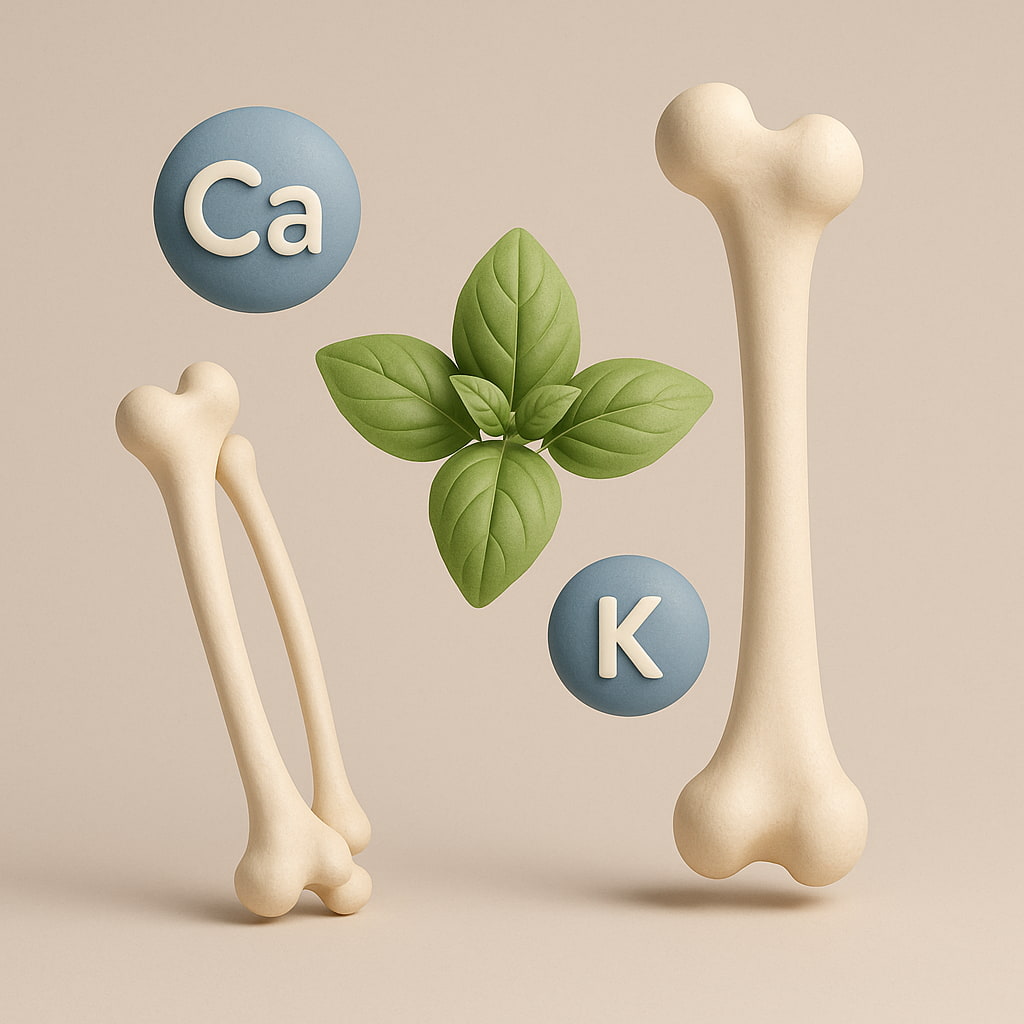
Basil is notably high in vitamin K, a nutrient essential for bone mineralization and calcium regulation. The NIH Office of Dietary Supplements emphasizes that adequate vitamin K intake helps the body produce proteins critical for bone strength.
Including vitamin K–rich foods like basil, spinach, and kale may support skeletal integrity and complement a diet designed to promote joint and bone wellness.
10. May Support Longevity and Overall Wellness
With its array of antioxidants, essential oils, vitamins, and phytonutrients, basil supports multiple systems in the body—from cardiovascular and immune to metabolic and cognitive health. Studies summarized by the National Institutes of Health suggest that antioxidant-rich diets are linked with improved markers of healthy aging and vitality.
Regularly using fresh basil in meals—soups, salads, or herbal infusions—may be a simple, flavorful way to promote balance and long-term wellness.
How to Use Basil for Best Results
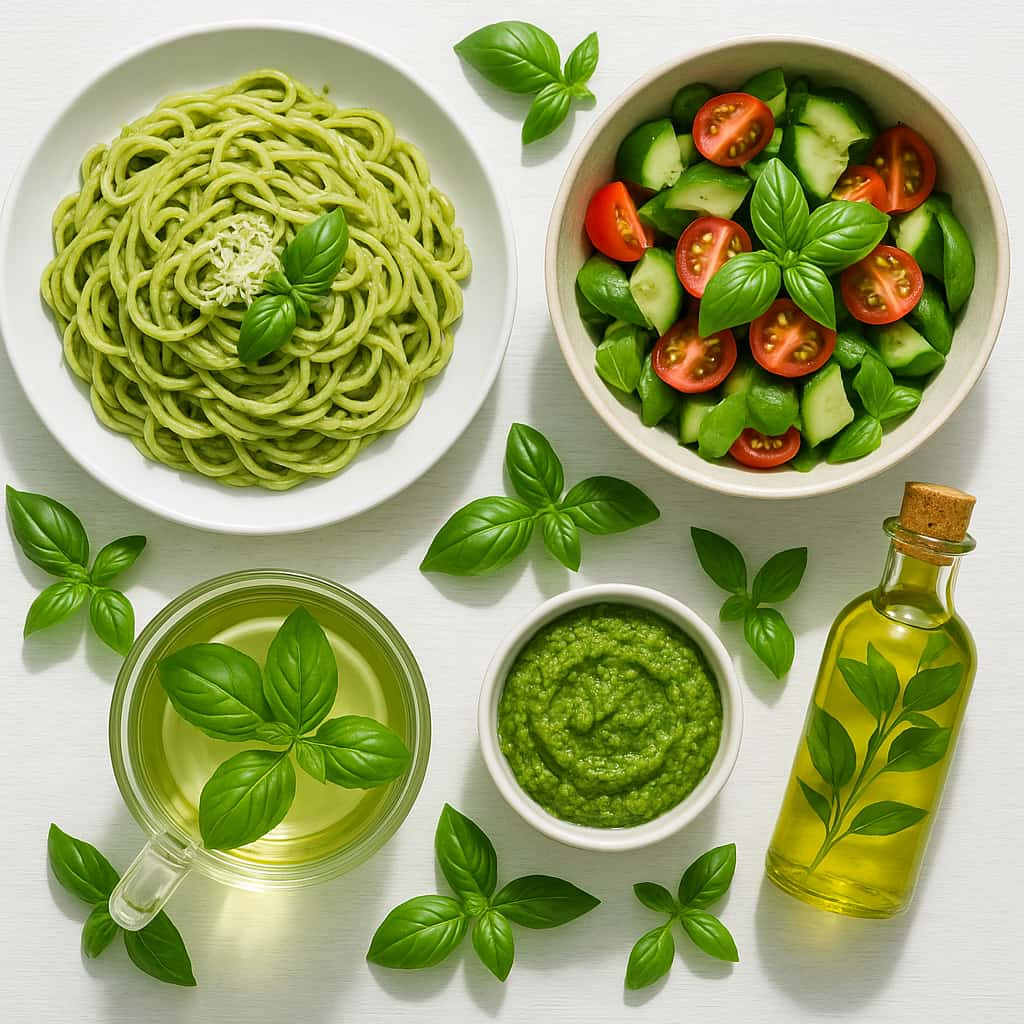
Basil is one of the most versatile herbs to include in a healthy, balanced diet. Its flavor, aroma, and nutrient content make it suitable for both culinary and wellness uses.
Culinary Uses
- Fresh leaves: Add to salads, soups, pasta, and sandwiches for a burst of flavor and nutrients.
- Pesto: Blend basil with olive oil, garlic, nuts, and parmesan for a heart-healthy sauce rich in antioxidants and healthy fats.
- Teas and infusions: Steep fresh or dried basil leaves in hot water to make a soothing herbal tea that supports hydration and relaxation.
- Infused oils: Store fresh basil in olive oil for a week (under refrigeration) to create a flavorful, antioxidant-rich drizzle for vegetables and grains.
Nutrition and Lifestyle Integration
According to Harvard Health Publishing, herbs like basil can enhance the nutrient density of meals by adding flavor without excess sodium or calories. The Cleveland Clinic also emphasizes incorporating fresh herbs daily as part of a heart-healthy eating pattern—similar to the Mediterranean diet—where basil complements fruits, vegetables, and lean proteins.
To retain its nutrients and delicate aroma, add fresh basil toward the end of cooking, and pair it with healthy fats (like olive oil) to improve the absorption of fat-soluble vitamins such as vitamin A and K.
Possible Side Effects and Precautions
Basil is generally safe in culinary amounts, but certain considerations apply when consumed in concentrated forms or by individuals with specific medical conditions.
1. Medication Interactions
Basil is rich in vitamin K, which supports blood clotting but may interfere with anticoagulant medications such as warfarin. The NIH Office of Dietary Supplements recommends maintaining consistent vitamin K intake rather than eliminating such foods entirely.
2. Allergy Potential
Although rare, basil allergies can occur, particularly among individuals sensitive to plants in the mint family. Symptoms may include mild oral itching or skin irritation after contact. Discontinue use and consult a healthcare professional if reactions appear.
3. Essential Oils and Concentrates
Basil essential oils and extracts should be used cautiously, as concentrated products vary in strength and purity. According to the U.S. Food and Drug Administration (FDA), dietary supplements—including herbal oils—are not approved for safety or effectiveness before marketing.
Use only high-quality, third-party tested products and avoid excessive use, especially during pregnancy or when taking medication. Pure basil oil may cause skin or digestive irritation if undiluted. Report any adverse reactions through the FD
Storage and Food Safety Tips
Proper storage helps maintain basil’s nutritional quality, flavor, and safety. Handling it correctly also reduces the risk of foodborne spoilage and contamination.
- Fresh basil: Store at or below 40 °F (4 °C) inside a loosely wrapped damp paper towel, then place in a breathable container or produce bag. Avoid washing until just before use to prevent excess moisture and mold.
- Dried basil: Keep in a tightly sealed, airtight container in a cool, dark cabinet below 77 °F (25 °C). Heat, light, or humidity can reduce essential oil content and color.
- Freezing: For long-term use, freeze chopped basil with a little water or olive oil in ice cube trays to preserve flavor and nutrients.
For official home storage and handling recommendations, refer to the U.S. Department of Agriculture (USDA) Food Safety and Inspection Service – Safe Food Storage Guidance.
Following these best practices helps extend shelf life, retain basil’s aroma and nutrition, and ensure it remains safe for consumption.
FAQs About Basil
Is basil good for heart health?
Basil may support cardiovascular wellness due to its antioxidants, magnesium, and anti-inflammatory compounds that contribute to normal blood vessel function. Incorporating basil into a diet rich in vegetables, fruits, and whole grains can promote overall heart health.
What’s the difference between sweet basil and holy basil?
Sweet basil (Ocimum basilicum) is commonly used in cooking for its mild, peppery flavor.
Holy basil (Ocimum tenuiflorum or tulsi), used in traditional Ayurvedic practices, contains higher levels of adaptogenic compounds that may support stress resilience and immune balance. Both types offer valuable phytonutrients and antioxidants.
Can you eat basil every day?
Yes, small daily amounts of fresh basil are safe and can enhance flavor without added salt or calories. However, concentrated extracts or supplements should only be used under professional guidance, as safety and dosage may vary.
Conclusion
Basil is more than just a fragrant kitchen herb—it’s a nutrient-dense, antioxidant-rich plant that may support heart, immune, and metabolic health when included as part of a balanced diet. With its variety of culinary applications, from pesto to tea, basil offers a flavorful way to boost both taste and wellness naturally.
This content is for informational purposes only and not medical advice.
